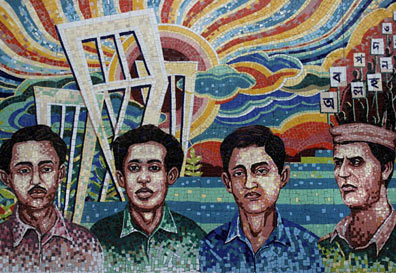 Agartala:
Agartala: Millions being killed, more being uprooted and a bleeding nation on the cusp of being born - it's a bleak, unsparing tale, but one that needs to be told. A dozen of Bangladesh's celebrated artists, supported by their Indian counterparts, have organised a painting exhibition here to mark the 40th anniversary of the Bangladesh liberation war.
"For our future generations and those who know little about the Bangladesh freedom battle, art and cultural advocates have initiated a campaign in and outside the country on the occasion of the 40th anniversary of the liberation war," famed Bangladeshi artist Qayyum Chowdhury said.
"India's bordering states - West Bengal, Tripura, Meghalaya and Assam - gave us 'anna, ashray and asthra' (food, shelter and arms). We are showcasing this great support," he added.
The four-day exhibition, inaugurated by Tripura Chief Minister Manik Sarkar Sunday, is being jointly organised by the Dhaka-based Bengal Gallery of Fine Arts and Kirat, an organisation of artists of northeast India.
Besides Chowdhury, other artists whose work is on display include internationally acclaimed Samarjit Roy Choudhury, Bangladesh's highest civilian award 'Ekushey Padak' winner Hashem Khan, and Unesco fellowship recipient Abdus Shakoor Shah.
The canvas and watercolour paintings depict the atrocities on women during the 1971 war, the sacrifices of the warriors and the combative spirit of the people during the nine-month long ordeal.
In his message for the exhibition, Bangladesh High Commissioner in New Delhi Tariq A. Karim said: "The vibrancy of this collection of 30 paintings by 12 legendary artists would be a brilliant showcasing of the rich blending of the treasures of Bangladesh traditional life with modern verve and style."
After the partition of India in 1947, the territory which is today Bangladesh was part of Pakistan, and was known as East Pakistan. India had provided economic, military and diplomatic support to the Mukti Bahini (Bangladeshi freedom fighters) against the Pakistani forces in the 1971 war.
On Dec 16, 1971, allied forces of the Indian Army and Mukti Bahini decisively defeated the Pakistani forces. It resulted in the largest surrender, in terms of the number of prisoners of war, since World War II.
Chief Minister Sarkar said: "Forces inimical to Bangladesh and India are still active in both countries. Everyone, specially the artists, must continue their crusade against these negative forces."
Renowned political analyst and columnist Gautam Das recalled: "During the war, over one crore (10 million) Bangladeshi nationals took shelter in Indian states."
"Over 1,600,000 Bangladeshi citizens had taken shelter in Tripura alone," he said.
Das, who has personal experience of the 1971 war, said that veteran communist leader Jyoti Basu had played a key role in providing relief to Bangladeshi refugees.
According to historian and writer Bikash Chowdhury, Tripura had six to seven camps from where the 'Muktijoddhas' (freedom fighters) fought the Pakistani forces.
Bangladesh freedom fighter and renowned writer Haroon Habib said: "Pakistani troops, aided by their local Islamist collaborators, killed an estimated three million people, raped over 300,000 women, destroyed innumerable homes and forced millions more to leave their homes."
"The freedom fighters displayed unparalleled bravery in the war," Habib said. "We are grateful to the Indian people, including the people of Tripura, for their unforgettable gestures to our freedom fighters and millions of refugees."
Many distinguished foreigners, including former heads of state, organisations and Indians, would be honoured by the Bangladeshi government in Dhaka Dec 16 on the occasion of the 40th victory day.
 Agartala: Millions being killed, more being uprooted and a bleeding nation on the cusp of being born - it's a bleak, unsparing tale, but one that needs to be told. A dozen of Bangladesh's celebrated artists, supported by their Indian counterparts, have organised a painting exhibition here to mark the 40th anniversary of the Bangladesh liberation war.
Agartala: Millions being killed, more being uprooted and a bleeding nation on the cusp of being born - it's a bleak, unsparing tale, but one that needs to be told. A dozen of Bangladesh's celebrated artists, supported by their Indian counterparts, have organised a painting exhibition here to mark the 40th anniversary of the Bangladesh liberation war.